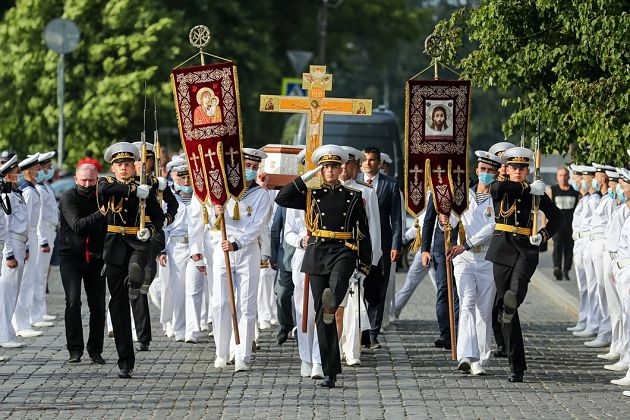Another religious event in Russia that is currently being discussed is the campaign to distribute the remains of Russian Admiral Fyodor Ushakov throughout the country and the worship of them by Orthodox believers. We will not discuss the religious aspect of this issue – Islam’s attitude to it is understandable, and it is not our intention to offend the religious feelings of the Orthodox. Let’s talk about something else.
It is the prerogative of the Russian Orthodox Church to have such rituals. However, the problem lies in the fact that this whole campaign was organized on the occasion of the Fleet Day of the Russian Navy (July 26) and was carried out under its auspices. In St. Petersburg and Kronstadt, the remains of Admiral Ushakov were solemnly received by military sailors, who then paraded with them on a boat and on land. And in itself, this is logical – for the Russian army, Ushakov is a legendary military commander, and honoring him with military honors seems appropriate. But there is one caveat…
The entire ceremony, from beginning to end, was given a distinctly religious character of only one denomination – the Russian Orthodox Church (ROC). Thus, military sailors of a secular state with a multi-denominational population paraded with crosses and banners, attended a service in an Orthodox church, and approached to kiss these remains as relics. The explanation given is that the ROC canonized Admiral Ushakov as a saint in 2001. And again, it is their prerogative – to consider someone their saint and to worship him. But even according to Putin’s amended Russian Constitution, aren’t religions supposed to be separate from the state, and aren’t all religious denominations equal? Then why are military ceremonies in which Muslims, Jews, Buddhists, and Christians of other denominations who do not recognize such rituals serve, given the character of a religious rite of only one denomination – the ROC?
However, since the opening of the Orthodox Church as the “Main Church of the Russian Armed Forces,” this question has become rhetorical. The secular and ecclesiastical authorities of Putin’s Russia, the further they go, give more and more indications that it is de facto not the secular democratic state of the Russian Federation, as described in its Constitution, but the Orthodox state of Russia and Crimea with the armed forces of the Crusaders.

